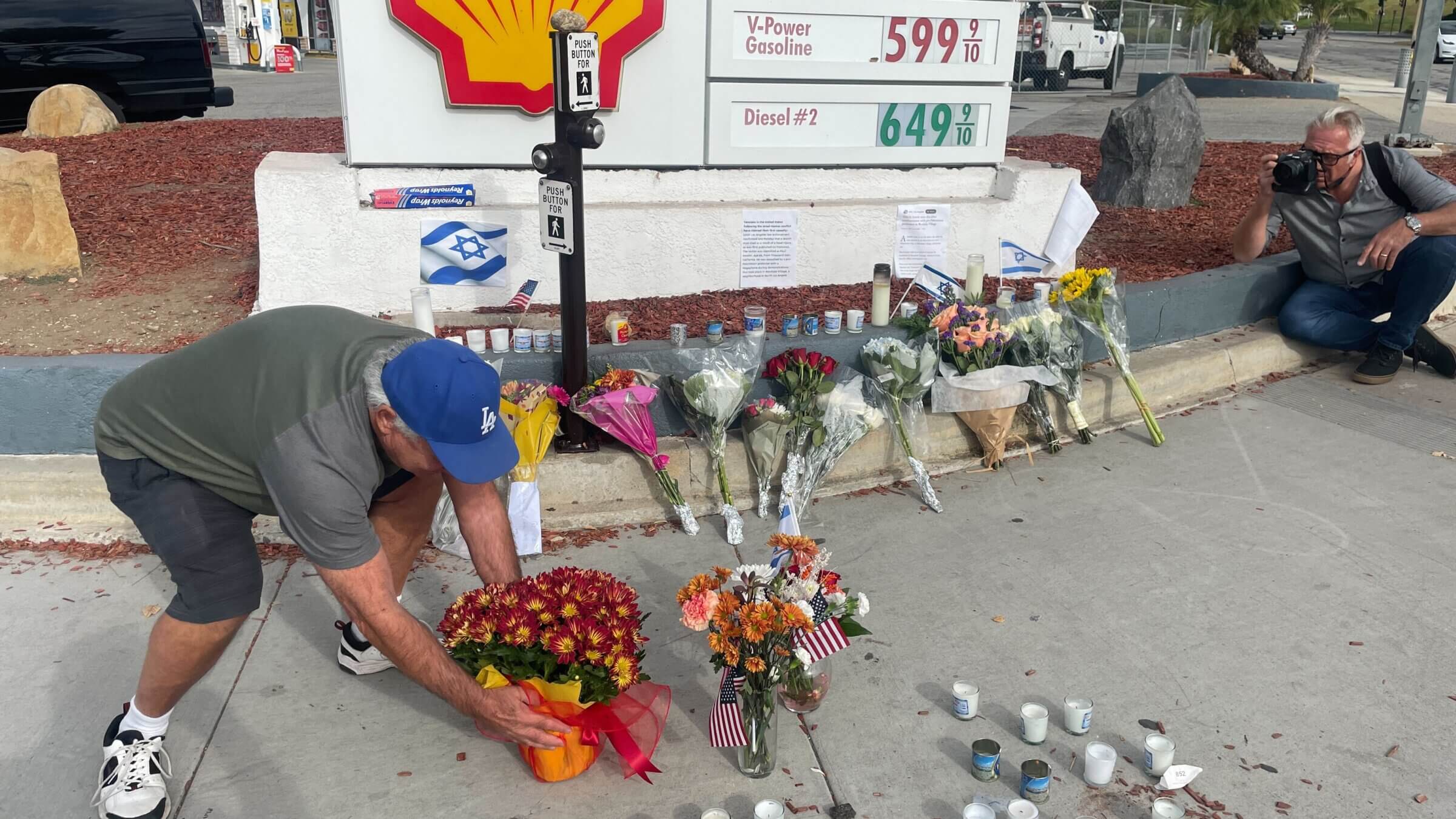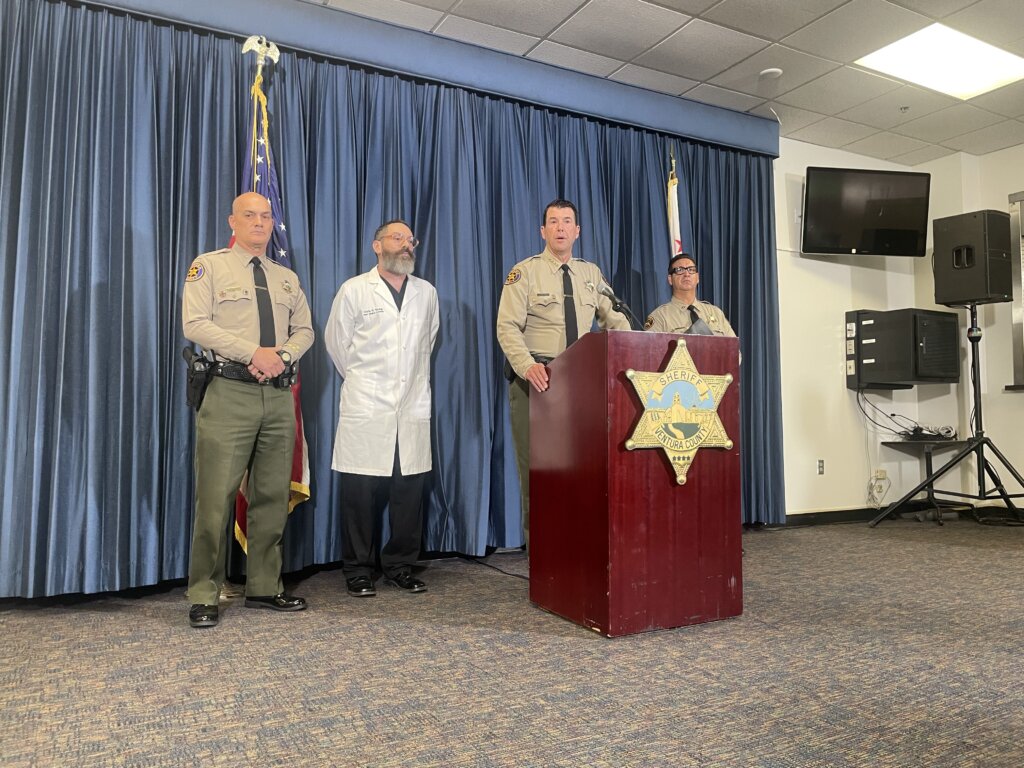Everything we know so far about the death of Paul Kessler
Law enforcement have heard contradictory accounts of how Paul Kessler sustained a fatal injury

Gary Gerber, 72, on Nov. 7, 2023, brought flowers to a temporary memorial for Paul Kessler that was set up at the site of his injury. Photo by Louis Keene
THOUSAND OAKS, California — Ventura County authorities provided new information Tuesday about the circumstances that led to the death of Paul Kessler, a Jewish man who succumbed to a head injury sustained during an altercation with a pro-Palestinian protester.
Kessler, 69, died at 1 a.m. Monday of blunt force head trauma, the day after he attended a pro-Israel demonstration that occurred alongside a larger pro-Palestinian demonstration in Thousand Oaks, about 35 miles northwest of downtown Los Angeles.
The county’s chief medical examiner said Kessler’s skull fracture and intracranial bleeding was “consistent with a fall,” but that he had also sustained an injury on the left side of his face.
Ventura County Sheriff Jim Fryhoff said at a press conference the department had interviewed the protester with whom Kessler had clashed, and described the person as a “suspect.”
But he said that the nature of the altercation — including “who the aggressor was” — remained unclear because of conflicting statements about what had occurred and a lack of definitive video evidence.

“Some of the witnesses were pro-Palestine, while others were pro-Israel,” Fryhoff said. “During the investigation at the scene, deputies determined that Mr. Kessler fell backward and struck his head on the ground. What exactly transpired prior to Mr. Kessler falling backward isn’t crystal clear right now.”
The county’s chief medical examiner, Dr. Chris Young, said the department had not determined how he sustained the facial injury.
The department said it had not determined how he sustained that injury.
Calls regarding Kessler’s injury were made to authorities around 3:20 p.m. Sunday, and when they arrived a few minutes later, he was conscious and bleeding from the mouth and head, Fryhoff said. Kessler was admitted to a local hospital at 3:53 p.m, where his condition worsened.
The manner of death was deemed a homicide Monday because Kessler died “at the hands” of another person, Young said. A public information officer for the sheriff’s department clarified later that calling it a homicide meant Kessler died “as a result of another human being’s actions.”
The ‘manner of death’
The “manner” of Kessler’s death was deemed a homicide Monday because Kessler died “at the hands” of another person, Young said, clarifying that a manner of death of homicide does not indicate that a crime has been committed.
A public information officer for the sheriff’s department hedged later, saying that calling it a homicide meant Kessler died “as a result of another human being’s actions” and not necessarily due to physical contact.
Fryhoff said he could not confirm earlier reports, including from the Jewish Federation of Greater Los Angeles, that the man had been struck on the head with a megaphone, but that it was one of the possibilities the department was investigating. He was unable to say whether deputies had obtained a megaphone at any point.
Detectives obtained a search warrant Monday at the suspect’s residence in Moorpark, several miles north of Thousand Oaks, and detained the suspect following a traffic stop in nearby Simi Valley at around 5 p.m., Fryhoff said. He was released following the completion of the search.
Fryhoff said he could not provide details about the search, but said the suspect, age 50, was cooperating with the investigation.
Fryhoff said he could not confirm earlier reports, including from the Jewish Federation of Greater Los Angeles, that the man had been struck on the head with a megaphone, but that it was one of the possibilities the department was investigating. He was unable to say whether deputies had obtained a megaphone at any point.
As part of the investigation, authorities were looking at security camera videos from surrounding businesses, but Fryhoff said video from the gas station where Kessler was hit was blocked by a sign advertising gas prices. He asked anyone who had information about or video of the incident to reach out to the Ventura County Sheriff’s Office.
Fryhoff declined to say whether Kessler provided any information about the incident to deputies prior to his death.
A comfortable place for Jews
Kessler’s death shattered the community at Temple Etz Chaim, a Conservative synagogue where he was a member and where his wife once served on the board.
Rabbi Ari Averbach, who has led the synagogue since 2019, said he did not know Kessler well enough to say anything substantive about him. But many Jews live in the area, he said, and the community is “reeling.”
“We are a quiet, mostly Jewish corner of the Los Angeles County area,” Averbach said. “This isn’t a place where we feel antisemitism. People proudly wear their Stars of David necklaces, their Hebrew names around their necks. That adds a level of shock to all of this — that this doesn’t feel like a place where this would happen.”
Based on the sheriff’s reports, Averbach said, it did not appear that the suspect had tried to kill Kessler, and it did not seem like the pro-Palestinian protesters sought such a conclusion. Likewise, he said, “Paul did not go to the rally to incite anybody.”
Still, he wondered whether it was appropriate for the protest to continue at that location.
“Are they allowed to continue? Are they allowed to be there, at this place where there was a homicide? Or is there a time where you say, ‘We were protesting at this place, saying that violence needs to end — and maybe violence needs to end.’”
‘We have protests all the time’
Rabbi Noah Farkas, chief executive of the Jewish Federation of Greater Los Angeles, attended the sheriff’s press conference and said he was pleased that the department was investigating Kessler’s death as a homicide.
He said that the federation had heard from several people — eyewitnesses and some second-hand reports — that Kessler had been struck in the head with a megaphone. “When someone tells us what they saw, what they heard, we believe them,” Farkas said.
Regardless of what happened before Kessler’s fall or who instigated the tussle, the federation head said, a Jewish man had died “while trying to express himself to be supportive of the Jewish community and the state of Israel. And so we as a Jewish community, and as Jewish leaders, have a responsibility to respond to that and to demand justice.”
Farkas also said Kessler’s death could have been prevented had sheriff’s deputies been present at the rally. It had been at least the third consecutive Sunday that a pro-Palestinian demonstration had been held at that intersection and attracted pro-Israel counterprotesters.
“Why didn’t they have deputies there full-time?” Farkas said. “I don’t believe that this wasn’t preventable. I believe that if they had dispatched the appropriate law enforcement to observe and maintain order, it might have been avoidable.”
In an interview, Sgt. Cyrus Zadeh, a public information officer for the Ventura County Sheriff’s Office, said that deputies had routinely passed through the intersection during the protest to assess its potential for danger, but that “there was no indication that there was going to be violence.”
He could not guarantee that there would be continuous sheriff’s department presence at future rallies, saying that it was not necessarily helpful because in some circumstances law enforcement’s presence could actually be “a catalyst” for escalation.
“Ventura County is a very peaceful community,” Zadeh said. “We have protests all the time. We always ask for them to do it peacefully, and they have. This incident, for Ventura County, is an anomaly.”
‘This is awful’
On the street corner in Thousand Oaks where Kessler fell, locals continued to leave bouquets and light yahrzeit candles Tuesday on pavement still stained by his blood.
The intersection, with several lanes going in each direction, is a popular site of demonstrations, one man said, as well as a place where firefighters occasionally stand with a boot to raise money at red lights.
Freddy Josef, who attended the rally on Sunday but did not arrive until after Kessler was taken away by ambulance, was one of the people who set up the memorial Monday night, bringing yahrzeit candles and miniature Israeli flags. He did not know Kessler personally.
“We are here to respect but we are here to continue to protest our cause,” Josef, who is Israeli, said. “Our cause is right, and the world is being quiet.”
Jaye Oliver, a Jewish woman with fingernails painted different shades of blue, cried as she stood looking at the memorial.
“I’ve gotten to the point where I don’t care what happens to the Palestinians,” Oliver said through her tears. “I don’t care about the kids, the women, because I know they don’t care about me. They want to kill me, they want to kill all Jews — and Christians.”
Not all of the people paying tribute at the memorial were Jewish.
Janet Jackson, a Catholic woman who lives in nearby Oak Park, has filled her gas tank at this station in the past. But she had come Tuesday not to refuel, but to “say I’m so sorry.”
“What my father fought in World War II for is happening again,” she said. “This is awful. I don’t know what this is.
“You’re not alone,” Jackson added. “I know it seems like you are, but they’re just evil and loud. We’re going to win this.”
A message from our Publisher & CEO Rachel Fishman Feddersen

I hope you appreciated this article. Before you go, I’d like to ask you to please support the Forward’s award-winning, nonprofit journalism so that we can be prepared for whatever news 2025 brings.
At a time when other newsrooms are closing or cutting back, the Forward has removed its paywall and invested additional resources to report on the ground from Israel and around the U.S. on the impact of the war, rising antisemitism and polarized discourse.
Readers like you make it all possible. Support our work by becoming a Forward Member and connect with our journalism and your community.
— Rachel Fishman Feddersen, Publisher and CEO




























